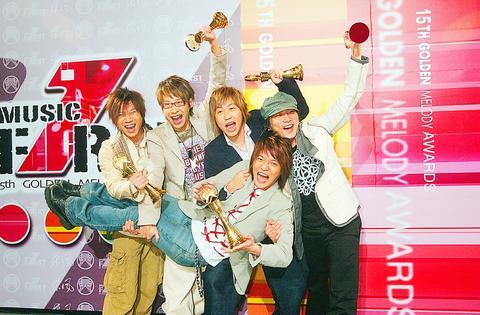Intermittent rain over Taipei couldn't dampen the atmosphere for approximately 2,000 screaming fans who turned up last night outside the Sun Yat-sen Memorial Hall to watch their favorite pop singers arrive at the 15th Golden Melody Awards, where Taiwanese singer Jay Chou (周杰倫) took the top honors for best album of the year.
His capturing the award came as little surprise to spectators and fans, who have watched Chou come to dominate the Chinese pop-music scene with four albums. Chou has won Golden Melody Awards each of the past three years. In accepting the award, Chou thanked his mother, after whom his winning album was named.
Much of the evening's excitement took place on the red carpet outside the venue, where the wild throng of mostly teenagers pressed against guard rails screaming at the sight of almost the entire pantheon of Mando-pop and Canto-pop stars who filed into the hall.

PHOTO: TAIPEI TIMES
For most fans, however, the Golden Melody Awards marks the high point on the Mandarin pop music calendar.
At one point, an unidentified man stormed onto the red carpet to try to confront the Korean singer Boa, who performed at the ceremony, but was immediately pushed back and after a short scuffle with security personnel, the man disappeared into the crowd.
The Golden Melody Awards -- Taiwan's equivalent of the Grammys -- recognize the best singers, bands and music professionals whose work is done in Mandarin, Taiwanese, Hakka and Taiwan's Aboriginal languages. Nominees for the awards come from Taiwan, China, Hong Kong, Malaysia, Singapore and Thailand and are reviewed by a panel of 30 judges made up of music industry professionals.

PHOTO: TAIPIE TIMES
Along with best album, other major categories at the awards include best male and female singers, best singing group and best band.
In the night's biggest surprise, Sky Wu (
Hong Kong Mando-pop diva Faye Wong (

PHOTO: TAIPEI TIMES
Mandarin female singer for her album To Love (
As many expected, pop rock group Mayday (
The best band category, however, is the only one that recognizes work by rock 'n' roll bands. "We needed this award. It tells us that we didn't choose the wrong path in making our kind of music," A-hsin said backstage.

PHOTO: TAIPEI TIMES
The second big surprise of the evening, after Sky Wu winning the best Mandarin male singer award, came with the relatively new duo Ah-bao (
The mother of the best lyricist awardee, Shawn Song (
Peng Shui-kuang (
Popular music garners the greatest amount of attention at the awards, with 16 categories, but 10 awards are also given to artists working in religious music, children's music, and classical styles of music.
This year's awards tried to put the best face on an industry that has seen its revenues decline by almost two thirds since its peak in 1998.
The decline in album sales as a result of pirating is the most important issue facing the industry, but no mention of these ills throughout the evening's proceedings.
15th Golden MelodyAward Winners
Best Album: Yeh Huei-mei by Jay Chou (
Best musical director: Kuang Sheng (
Best instrumental album: Crystal Boys (
Best composer: Hsieh Hsiao-juan (
Best lyricist: Shawn Song (
Best arrangement: Chong Hsing-min (
Best producer: Lee Hom Wang (
Best Mandarin male singer: Sky Wu (
Best Taiwanese male singer: Chang Yu-wei (
Best Mandarin female singer: Faye Wong (
Best Taiwanese female singer: Showlen Maya (
Best Hakka singer: Xie Yu-wei (
Best Aboriginal singer: Peng Shui-kuang (
Best band: Mayday (
Best singing group: Ah-bao (
Best newcomer: Lin Junjie (

As Taiwan’s second most populous city, Taichung looms large in the electoral map. Taiwanese political commentators describe it — along with neighboring Changhua County — as Taiwan’s “swing states” (搖擺州), which is a curious direct borrowing from American election terminology. In the early post-Martial Law era, Taichung was referred to as a “desert of democracy” because while the Democratic Progressive Party (DPP) was winning elections in the north and south, Taichung remained staunchly loyal to the Chinese Nationalist Party (KMT). That changed over time, but in both Changhua and Taichung, the DPP still suffers from a “one-term curse,” with the

Jan. 26 to Feb. 1 Nearly 90 years after it was last recorded, the Basay language was taught in a classroom for the first time in September last year. Over the following three months, students learned its sounds along with the customs and folktales of the Ketagalan people, who once spoke it across northern Taiwan. Although each Ketagalan settlement had its own language, Basay functioned as a common trade language. By the late 19th century, it had largely fallen out of daily use as speakers shifted to Hoklo (commonly known as Taiwanese), surviving only in fragments remembered by the elderly. In

William Liu (劉家君) moved to Kaohsiung from Nantou to live with his boyfriend Reg Hong (洪嘉佑). “In Nantou, people do not support gay rights at all and never even talk about it. Living here made me optimistic and made me realize how much I can express myself,” Liu tells the Taipei Times. Hong and his friend Cony Hsieh (謝昀希) are both active in several LGBT groups and organizations in Kaohsiung. They were among the people behind the city’s 16th Pride event in November last year, which gathered over 35,000 people. Along with others, they clearly see Kaohsiung as the nexus of LGBT rights.

In the American west, “it is said, water flows upwards towards money,” wrote Marc Reisner in one of the most compelling books on public policy ever written, Cadillac Desert. As Americans failed to overcome the West’s water scarcity with hard work and private capital, the Federal government came to the rescue. As Reisner describes: “the American West quietly became the first and most durable example of the modern welfare state.” In Taiwan, the money toward which water flows upwards is the high tech industry, particularly the chip powerhouse Taiwan Semiconductor Manufacturing Co (TSMC, 台積電). Typically articles on TSMC’s water demand